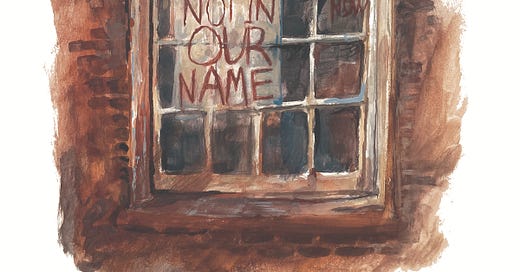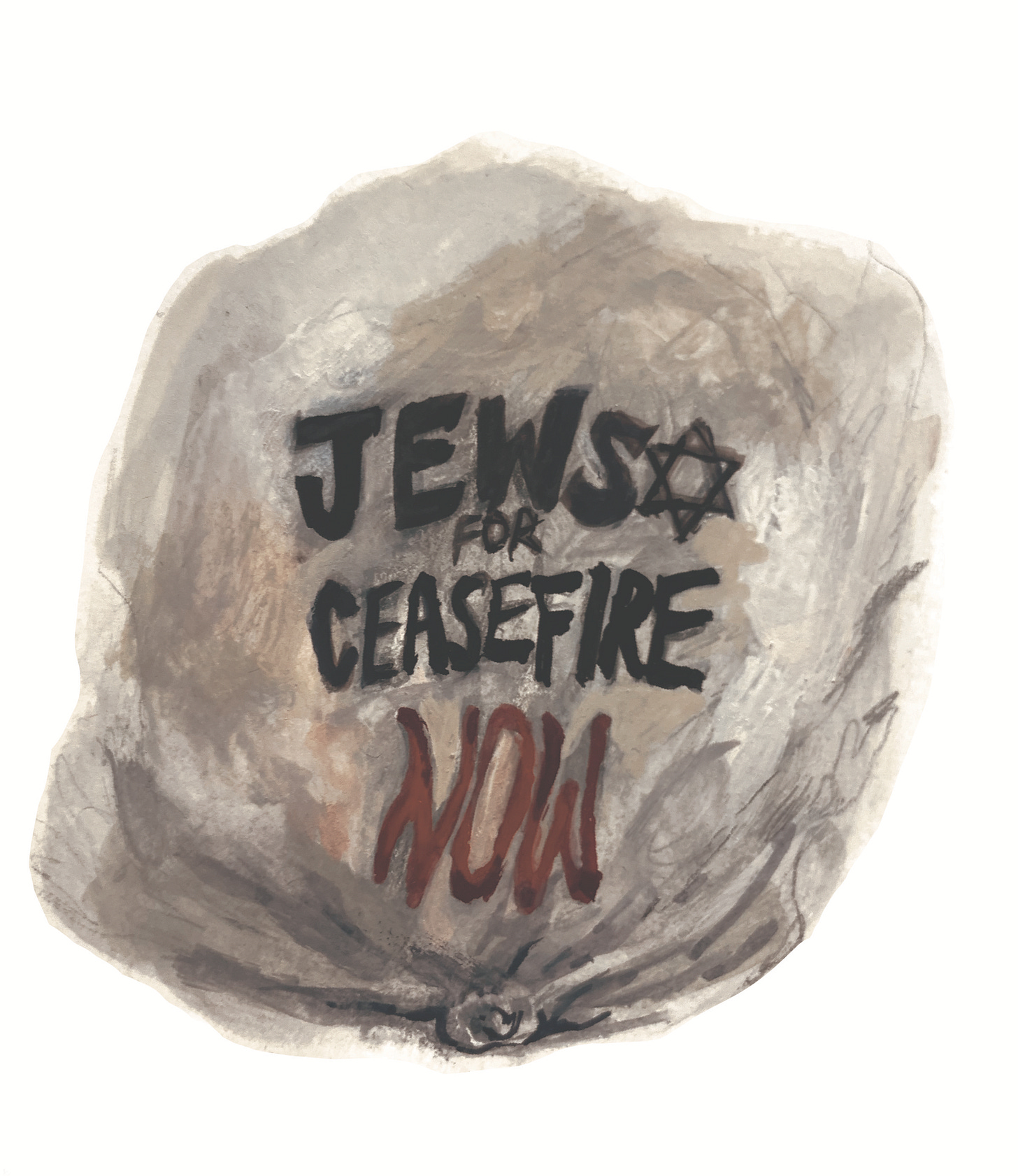Build This World from Love: Five weeks and four decades of anti-apartheid student organizing
“Antisemitism is very real. Calling for a ceasefire is not antisemitism."
This piece was originally published in The College Hill Independent. Reprinted with permission.
On the afternoon of November 8, the Brown University administration facilitated the arrest of 20 Jewish students engaging in a peaceful sit-in at University Hall. The students, part of a newly established student organization called Brown University Jews for Ceasefire Now (JFCN), announced that they would not leave the campus’ central administrative building until Brown president Christina H. Paxson committed to supporting the University’s divestment from “companies that enable war crimes in Gaza.” Starting at 5:44 p.m., the Providence Police Department, with the assistance of Brown’s Department of Public Safety, arrested all 20 students. While tensions between the University and students reached a boiling point on November 8, student organizing has defined the campus landscape over the past five weeks.
On Thursday, October 12, Brown Students for Justice in Palestine (SJP) held a vigil on the Main Green. Following a surprise attack by Hamas on October 7 that killed close to 1,200 Israelis, the Israeli government launched an intensive military campaign in the Gaza Strip. By the day of the vigil, Israel had killed at least 1,300 Palestinians, and their bombs kept falling as students gathered, spoke, and prayed. In the days thereafter, Israel has continued to use the atrocities of October 7 to justify an unprecedented assault on Gaza—which has included cutting off access to fuel, electricity, and water in the strip. Multiple historians of modern genocide have characterized the ongoing incursion as a clear case of genocide.
By October 21, the Israeli offensive had intensified and the death toll in Gaza had reached nearly 5,000. Close to a thousand community members gathered on the steps of the Rhode Island State House to rally for “an end to occupation, genocide, and U.S. aid to Israel.” The event was collectively organized by Brown SJP, Jewish Voice for Peace Rhode Island (JVP-RI), and Direct Action for Rights and Equality (DARE), among other local organizations.
As Israel continued to prepare for a ground invasion into Gaza, on Wednesday, October 25, Brown SJP and the Brown University Palestine Solidarity Caucus (PSC) hosted a walkout “in solidarity with Palestine” alongside student groups at over 100 universities. Their joint statement reads, “We demand that Brown University use its power to pressure Rhode Island senators to call for a ceasefire, protect its Palestinian community members and co-strugglers from harassment, and divest its endowment from companies that enable the Israeli occupation.” In the days following, the Palestinian death toll approached 8,000 and the Israeli military continued to target hospitals, now in a dire shortage of life-saving resources.
On Tuesday, November 7, the Brown Daily Herald (BDH) published two op-eds: a letter signed by over 160 Brown University faculty members calling for “a ceasefire in Israel-Palestine and the protection of academic freedom and student activism,” and “An open letter from Jewish students” by “a collective of anti-occupation Jews.” The signatories of the student letter emphasized the consonance (rather than the conflict) between their Jewish identities and their opposition to the ongoing genocide in Palestine and expressed their solidarity with SJP. “It’s not despite but because of my Jewish identity that I call for justice,” said Rafi Ash B’26, one of the signatories of the open letter, in an interview with the College Hill Independent. These two letters came as the IDF closed in on Gaza City, with Israel’s defense minister threatening to “[tighten] the noose” in occupied Palestine.
The next day, November 8, more than 400 people gathered on the Main Green in another walkout organized by SJP. “No rest until we divest,” the organization promised. The walkout began with speeches, poems, and chants delivered by organizers, but it soon transitioned to a march circling University Hall. Protestors recited chants ranging from “What do we want? (Divestment!) When do we want it? (Now!)” to “Christina Paxson, you can’t hide, Brown’s supporting genocide.”
Shortly before 1:00 p.m., Brown SJP and PSC introduced a third student group organizing for Palestinian liberation—Brown University Jews for Ceasefire Now (JFCN). The group, which was also listed as a contact on the BDH student op-ed, announced that 20 Jewish students would not leave University Hall “until President Christina Paxson publicly [committed] to include and support a divestment resolution in the next meeting of the Brown Corporation.” As their peers applauded, the 20 students entered the building.
According to interviews with the Indy, the 20 members of JFCN sitting in spoke with multiple administrators about their demands while inside, including Vice President of Campus Life Eric Estes and several deans. President Paxson was not present in the building that day. Shortly before 5:00 p.m., the administration had not agreed to the students’ demands, and the building was about to close.
The group then posted on Instagram calling for students to gather outside University Hall “in support of students sitting in.” Soon, roughly 500 people had gathered on the Quiet and Main Greens in the cold, long after sunset. Organizers passed around song sheets with various Hebrew prayers calling for peace. But for two hours straight, one hymn echoed in unison through the crowd:
“Olam chesed yibaneh, yai dai dai (עוֹלָם חֶסֶד יִבָּנֶה) / I will build this world from love… yai dai dai / And you must build this world from love… yai dai dai.”
The crowd continued singing even when, just before 5:45 p.m., Brown Department of Public Safety and Providence police arrived on the green, called in by the University to arrest its own students. In a statement sent to the Indy, the administration said that they issued “multiple trespass warnings” before moving forward with arrests.
DPS officers restrained the students with handcuffs and zip ties and escorted them one by one from University Hall. The protesters emerged from the doors of the building as their peers sang louder, lining the path from the building to the gates. They joined in the crowd’s hymn as they were marched across the Quiet Green. “Hug a stranger,” one of the organizers shouted through a megaphone. “There is no shortage of love here.”
Ash told the Indy about his experience of the arrests from inside University Hall:
“There was a song that we sang that goes, ‘Where you go, I will go, my friend.’ But, you can replace the ‘my friend’ in that line with anyone’s name. When each person was carried out, we changed the name in that verse and to their name. And it was very powerful to then walk out and see the crowd on the outside providing the same kind of support.”
It took two hours for all 20 students to be arrested. Between verses, organizers on the ground shouted through the megaphone: “The Jewish name is not a war cry” and “Not in our names, not ever.” After the final student was taken into police custody, organizers urged attendees to sustain their support for the 20 students by attending their arraignment, which is currently set for November 28. The protestors have been charged with willful trespass, a misdemeanor under Rhode Island law.
JFCN explicitly aims to amplify SJP’s demands for ceasefire, student protection, and divestment. Both groups oblige the University to reject its longstanding complicity in Israeli apartheid.
Brown SJP noted before the statehouse rally that “Israel is committing a U.S.-backed genocide in Gaza and Brown University is profiting from it.” To JFCN, divestment would be the most consequential action that the University could take to condemn the violence in Palestine and express support for a ceasefire.
Brown’s $6.5 billion endowment is invested in weapons manufacturers that profit from Israel’s apartheid regime, including the mega-corporations Textron, Raytheon, and Northrop Grumman, among others. “Until Brown heeds the demands of its community and divests from all companies that enable Israeli apartheid, the University remains complicit in profiteering from the indiscriminate bombing of Gaza,” writes SJP. “As Brown students, we have a responsibility to the people of Gaza.”
Calls for Brown to divest are not new. In a 2019 referendum conducted by the Undergraduate Council of Students, 69% of voters supported divestment. A second referendum among graduate students in 2021 showed 87% approval. Ash, who was also one of the 20 students arrested, pointed to this widespread support as part of the reasoning behind staging the sit-in. “With civil disobedience, you do it when you have exhausted every granted path,” he said. “We wanted to call them to a place where they have to make their political non-neutrality, which has been true for decades, explicit… When you're putting your money there, you cannot be neutral.”
Across the country university students face disciplinary action, doxxing, and police violence for their participation in movements for justice in Palestine. On October 8, 33 student groups at Harvard signed on to a letter written by the University’s Palestine Solidarity Committee (PSC), condemning Israel for the “unfolding violence” in Gaza. In the wake of this letter, a computer science professor urged Harvard to blacklist the co-signatory organizations. The conservative group Accuracy in Media paid for a truck to encircle Harvard Square, plastered with affiliated students’ names and faces. Corporate CEOs have created “no-hire” lists including the involved students. Columbia University and Brandeis University have recently suspended their SJP chapters (Columbia suspended its chapter of JVP, too). Just last weekend, Waltham police at Brandeis violently restrained students peacefully protesting in front of the Shapiro Campus Center.
The suppression of free speech has often been defended, implicitly or otherwise, as protecting students from antisemitism. Brandeis, for example, cited “hate speech” as a reason for de-recognizing its SJP chapter, while Columbia pointed to “threatening rhetoric and intimidation.” Harvard’s doxxing truck called signatories of the University’s PSC letter “Harvard’s Leading Antisemites.” And for years, Canary Mission has blacklisted and facilitated the harassment and silencing of pro-Palestinian student activists, especially Muslims and students of color, under the guise of identifying and combating antisemitism.
The U.S. has undeniably witnessed a rise in antisemitic and Islamophobic incidents over the past five weeks. During the last week of October, a Cornell student threatened to kill his Jewish peers on an online messaging board. Antisemitism was widespread in the United States long before the October 7 attacks, too, including at Brown: just last year, a note containing violent threats against Jewish people was left at the Brown/RISD Hillel. But members of Brown’s JFCN, and other anti-occupation Jewish students across institutions, “do not accept a Jewish ethnostate as the solution to [their] struggle.” They resist being used as “rhetorical shields,” their “safety” invoked to justify the genocide of the Palestinian people.
They push back against the frequent conflation of anti-Zionism and pro-Palestinian advocacy with antisemitism. Refusing to distinguish between the two, they argue, bolsters actors that seek to shut down pro-Palestinian activism, and cheapens the accusation of antisemitism along the way. “Antisemitism is very real,” one of the students sitting in, Rita Feder B’24, told the Indy. “Calling for a ceasefire is not antisemitism.”
This isn’t the first time university administrators have confronted students peacefully occupying university property in an effort to prompt Brown to divest from an apartheid regime. Throughout the late 1970s and early 1980s, Brown students protested the University’s investment in companies operating in South Africa through sit-ins, shantytowns, and hunger strikes. In March 1986, a group of student organizers under the banner of the Brown Free Southern Africa Coalition (BFSAC) sat in at the IBM office in Providence. They were arrested by the Providence Police Department, and the incident was reported in the New York Times.
When the Brown Corporation voted to incrementally divest over a period of two years and “review” its finances in 1988, the BFSAC also began a hunger strike, to which the University responded by suspending the students. The movement at Brown University wasn’t entirely successful on its own—it didn’t win immediate or complete divestment. But in coalition with other university anti-apartheid organizations, particularly at Harvard and UC Berkeley, Brown students’ advocacy prefigured a significant legislative impact when Congress passed the Comprehensive Anti-Apartheid Act.
About his involvement in the anti-apartheid movement, alumnus and Professor of Law James Forman Jr. told the Indy that “the University will always resist at first.” Another anti-apartheid group at Brown republished a statement in the 1980s from then-president Howard Swearer, who said, “I think South Africa is a flagrant violation of human rights. But where do you draw the line? You have to take the morality of investments on a case-by-case basis.” Yet two decades later, the University had changed its tack: In 2013, President Paxson released a statement lauding former president Nelson Mandela—who had urged U.S. students to do all they could to win divestment from South Africa. Ash told us: “As soon as it's out of the immediate, all of a sudden, the moral imperative has become clear.”
The University’s response to South African divestment demonstrations mirrors President Paxson’s response to the 2019 referendum. At the time, she wrote in a letter addressed to the Brown community, “[the] endowment is not a political instrument to be used to express views on complex social and political issues, especially those over which thoughtful and intelligent people vehemently disagree.”
But members of JFCN look to the 1987 Divest Brown case as evidence that the University’s stance is more amenable to change than it claims to be. “In the middle of our broadcast, [Vice President Estes] came in and talked to our administrative liaison, one of the other students, and was like, ‘No matter how long you stay, [President Paxson] has said she will not change her mind,’” said Ash. “And that's not true. We've seen years and years of ‘the administration won't change their mind’—until they do.”
Graduate students and faculty have joined undergraduates in their push for justice in Palestine. On November 13, the Graduate Labor Organization (GLO) published a letter of solidarity with JFCN, echoing their call for “ceasefire and divestment” and also urging the University to “drop all legal charges” against arrested students. Already, 194 faculty have publicly signed a letter to President Paxson asking that charges be dropped and that the students’ demands be taken seriously. Andrea Flores, Assistant Professor of Education and one of the signatories, told the Indy:
“It is incumbent on us as faculty to support our students. If we are serious about cultivating Brown students as active and engaged citizens of the world, then the students who were arrested should not face any disciplinary action or legal charges.”
Undergraduates are not alone in their calls for divestment and ceasefire.
The United Nations has warned of a starvation crisis in the Gaza Strip. Since Israel cut off the fuel supply to Gaza, waste can no longer be properly transferred to landfills, leading to a high risk of airborne disease. Amidst these health crises, Israel has deprived Gazan hospitals of electricity. Over 11,100 are dead - one in every 200 Gazans - and Israel continues to encroach on refugee camps and push south. Noura Erakat recently termed Israeli incursion an “ongoing Nakba,” a reference to the 1948 displacement of 700,000 Palestinians.
“We don’t plan on going away,” Feder says, of JFCN’s ongoing efforts. “We plan on getting louder.”
Over the coming weeks and months, the College Hill Independent is committed to regularly updating a blog post with news about campus organizing and information about how to get involved in action.
SOFIA BARNETT B’25, KIAN BRAULIK B’24.5, CAMERON LEO B’25, and LILY SELTZ B’25 for divestment and a ceasefire now.












